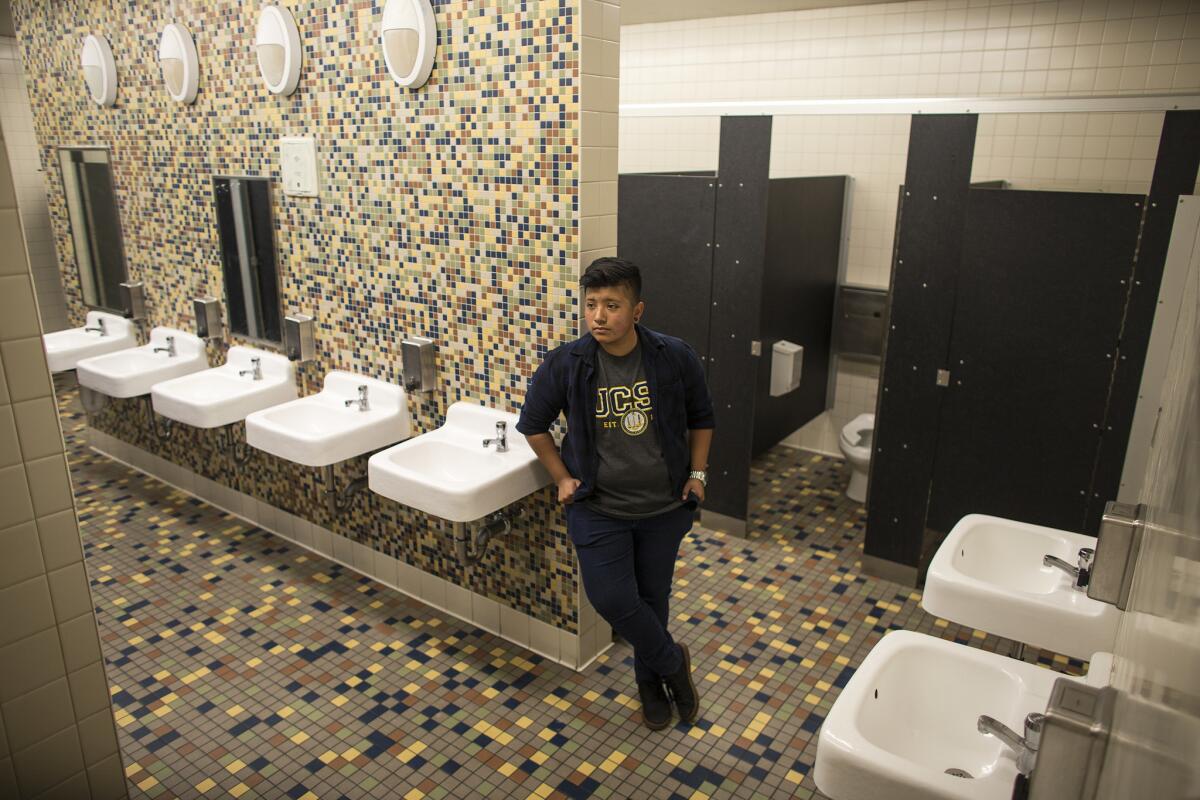What Trump’s policy means for transgender students in California

The Trump administration announced Wednesday that it is dropping federal protections for transgender students, causing concern among LGBT advocates and students throughout the country.
Here’s a Q&A on the consequences of the new White House policy for local schools.
What does this mean for students in California?
On paper, transgender students in California won’t see any changes — President Trump’s stance is to leave transgender rights up to states, and California’s laws are some of the country’s strongest when it comes to protecting transgender students.
But losing federal protection could negatively affect transgender children in the state, particularly in conservative areas where students may be afraid to speak up.
“I do worry about kids in rural areas of California as well as kids in states that don’t have as strong protection as California does,” said Asaf Orr, an attorney for the National Center for Lesbian Rights who works on transgender youth rights.
It is a school district’s responsibility to recognize a student’s gender identity and protect them from discrimination or bullying, but it’s often up to the student or the student’s family to report these incidents or take legal action to remedy them.
“The real effect of this move on those kids is to make their schools more hostile,” Orr said. “And also the secondary effect on their peers as a license to discriminate.”
Los Angeles Unified schools haven’t seen a increase in bullying against transgender or gender nonconforming students recently, said Judy Chiasson, a coordinator in the district’s office of human relations, diversity and equity.
She sees the policy shift in Washington as an opportunity for local schools to publicly reinforce their support for transgender students and encourages families who feel they are being mistreated to talk to their school administrators or call her office.
L.A. Unified Supt. Michelle King committed to continuing to protect transgender students in a statement Wednesday.
“Transgender students in L.A. Unified will remain protected regardless of the new directive by the Trump administration pertaining to access to restrooms and locker rooms,” King said in her statement. “The California Education Code and long-established district policies permit pupils to use facilities consistent with one’s identity.”
L.A. Unified has had a policy to recognize students’ gender identity and protect them from discrimination for more than a decade. They strengthened the language in 2014, and embraced progressive moves including the construction of a multistall, gender-neutral bathroom at Santee Education Complex.
The school board president, Steve Zimmer, also reiterated the district’s commitment to transgender students in a statement Thursday.
The board “refuses to withdraw our commitment to the safety and dignity of our transgender students,” Zimmer said. “[E]very student in this nation’s second-largest school district will continue to use the facilities that match their identity.”
What can California students do if they believe their rights are being violated?
For the last eight years lawyers and advocates often relied on the Obama administration, rather than on California’s state government, to enforce transgender student rights in a number of school districts, including Downey and Arcadia.
In these federal cases, the Department of Education’s Office for Civil Rights investigated student complaints and reached binding agreements with school districts that outlined the changes they needed to make to keep their federal funding.
Students who feel their rights are being violated can also appeal to the state, but advocates and lawyers have often suggested going the national route instead, because California hasn’t always done a good job of ensuring that school districts are keeping students safe. In 2013, the state auditor found that the state often took too long to resolve complaints.
Orr filed a state complaint for a family in a Northern California school district in 2011. The district received the state’s response in 2015.
The California Department of Education has since created a new office devoted to nondiscrimination efforts.
Orr hasn’t filed any complaints with California since that revamp, he said, so he doesn’t know whether the situation has improved.
The state’s superintendent, Tom Torlakson, reiterated California’s commitment to protecting transgender students in a statement Wednesday.
“California students will continue to have their civil rights protected,” he said. “California will continue to work to provide that environment for our lesbian, gay, bisexual, and transgender students regardless of any misguided directives by the federal government and the Trump administration.”
To read the article in Spanish, click here
Reach Sonali Kohli at Sonali.Kohli@latimes.com or on Twitter @Sonali_Kohli.
ALSO
Trump administration rescinds guidelines on protections for transgender students
DeVos reportedly disputed Trump plans to roll back transgender student protections
The state plans to keep its promises to transgender students, says California schools chief
More to Read
Start your day right
Sign up for Essential California for news, features and recommendations from the L.A. Times and beyond in your inbox six days a week.
You may occasionally receive promotional content from the Los Angeles Times.







